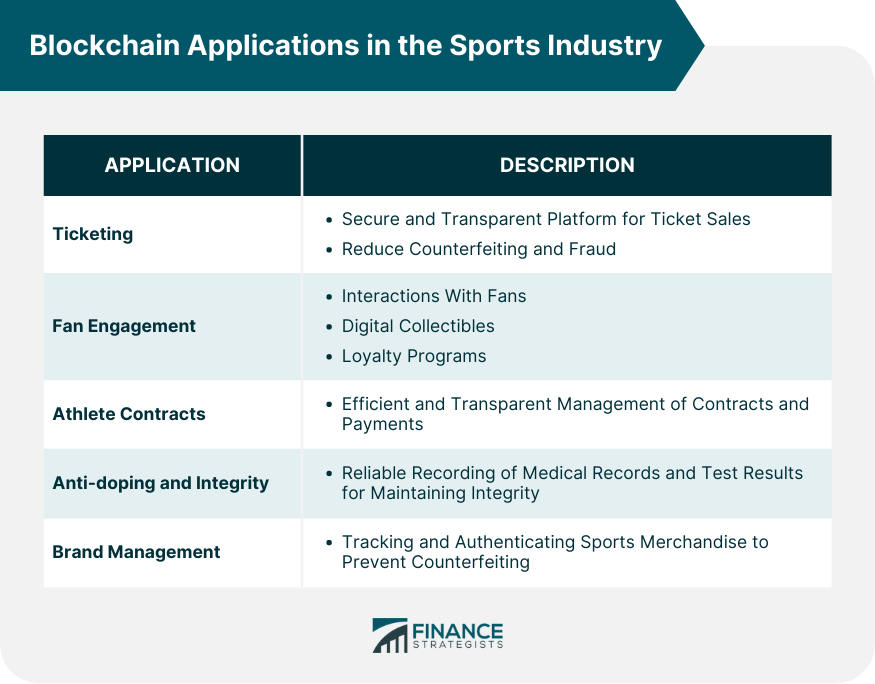Blockchain, a trailblazing technology best known for underpinning cryptocurrencies like Bitcoin, is beginning to gain ground in the sports industry. While initially designed as a distributed, immutable ledger for financial transactions, the scope of blockchain extends far beyond this, bringing forth numerous benefits and applications to the sports industry. The decentralized nature of blockchain, combined with its inherent security and transparency, has found relevance in diverse aspects of sports - from ticketing and fan engagement to player contracts and brand management. This versatility promises to bring profound transformation to the sports industry, enhancing efficiency, increasing trust, and providing new opportunities for engagement and revenue. The blockchain serves as a disruptive technology that can overhaul traditional systems, providing increased security, reducing fraudulent activities, and opening new avenues for interaction between athletes, clubs, and fans. Its utility stems from the inherent qualities of the technology. Blockchain's decentralized and immutable nature ensures that transactions and agreements on the network are transparent and tamper-proof. This brings an unprecedented level of trust and efficiency, which can be utilized across multiple areas within the sports industry, from ticket sales to memorabilia authenticity, contract management, and fan engagement. Conventional ticketing systems are often plagued by problems like counterfeiting and ticket touting, which lead to revenue losses for event organizers and inflated prices for fans. Blockchain can offer a solution to these issues, providing a secure and transparent platform for ticket sales. By recording each ticket sale on an immutable blockchain, the technology ensures the traceability and authenticity of each ticket. This makes it nearly impossible to counterfeit tickets and can drastically cut down on the secondary market's unfair practices. The end result is an improved experience for fans and higher revenue returns for sports clubs and event organizers. Blockchain can provide a secure and reliable platform for creating digital collectibles, offering fans unique memorabilia tied to their favorite teams or athletes. With each digital collectible being recorded on the blockchain, fans can be assured of their authenticity and rarity. Moreover, blockchain can enable more direct interactions between athletes, teams, and fans, fostering a stronger connection. Teams and athletes could issue tokens representing voting rights or rewards, allowing fans to participate in certain decisions, access exclusive content, or receive discounts on merchandise. Blockchain has substantial potential when it comes to managing athlete contracts and payments. Using blockchain-based smart contracts, automatic execution of contractual obligations can be achieved. For instance, once a player reaches a specific performance goal, the smart contract can automatically trigger a bonus payment. This not only makes the payment process more efficient and transparent but also helps in reducing disputes. Moreover, using cryptocurrencies for player payments can simplify transactions, especially for international players who otherwise face currency exchange issues. One of the significant areas where blockchain could have an impact in the sports industry is in maintaining integrity and curbing doping. The immutable nature of blockchain makes it a suitable technology for recording athletes' medical records and anti-doping test results. Once data is stored on a blockchain, it cannot be altered or deleted, providing a reliable record that can help in tracking an athlete's health and ensure adherence to anti-doping regulations. This could go a long way in restoring faith in the fairness of competitive sports and reducing instances of fraudulent practices. In the realm of brand management, blockchain can provide a robust solution for tracking and authenticating sports merchandise. Counterfeit merchandise is a significant issue for sports brands, with fans often unknowingly purchasing fake products. Blockchain's immutable and transparent nature can ensure that each piece of merchandise can be traced back to its origin, confirming its authenticity. This can help protect the brand's reputation, provide fans with genuine products, and ensure revenues are not lost to counterfeit goods. Public blockchains, as they are currently designed, can process only a limited number of transactions per second. This could pose problems for large-scale applications such as ticket sales for major sporting events, where thousands of transactions may need to be processed in a short span of time. Moreover, as more transactions are added, the size of the blockchain grows, which could lead to slower transaction times and increased storage requirements. While solutions like sharding and off-chain transactions are being explored, scalability remains a challenge to be addressed. Transaction speed is another technical challenge facing the adoption of blockchain in the sports industry. For instance, Bitcoin, the most prominent blockchain application, can only process around seven transactions per second, while Ethereum can handle about 15. Compared to traditional systems like Visa, that can process thousands of transactions per second, this is a significant drawback. Slow transaction speeds could be a deterrent to the adoption of blockchain, especially in applications requiring real-time transactions. Continued research and development are needed to enhance the transaction processing capacity of blockchain systems. The decentralized nature of blockchain makes it difficult to apply traditional legal frameworks to blockchain transactions. Issues around data privacy, intellectual property rights, and contractual obligations need to be carefully navigated. The absence of global regulation and standardization further complicates matters, leading to uncertainty that may hinder the adoption of blockchain. For many stakeholders in the sports industry, blockchain remains an unfamiliar and complex technology. This lack of understanding can result in hesitation to adopt the technology. There's also the task of integrating blockchain with existing systems, which may require significant time and investment. Overcoming these barriers will require ongoing education to improve understanding of the technology, along with the development of user-friendly blockchain applications tailored to the needs of the sports industry. Finally, resistance from established industry players can hinder the adoption of blockchain technology in the sports industry. Changes in processes and systems can often face resistance due to the comfort of established practices and the fear of the unknown. Given the disruptive nature of blockchain, it's not unusual for it to face pushback from those who have a vested interest in maintaining the status quo. Overcoming this resistance will require demonstrating the tangible benefits of blockchain and engaging with stakeholders to address concerns and potential roadblocks. Establishing partnerships and collaborations with blockchain companies can be a strategic approach to incorporating blockchain technology in the sports industry. By joining forces with established blockchain companies, sports organizations can leverage their expertise and resources to implement blockchain solutions effectively. These partnerships can involve sharing knowledge, conducting joint research and development, and co-creating innovative blockchain-based applications tailored to the specific needs of the sports industry. Collaborating with blockchain companies also provides access to their existing blockchain infrastructure, networks, and user base, facilitating the adoption and scalability of blockchain solutions in sports. These initiatives involve selecting specific use cases or areas within the industry to experiment with blockchain solutions on a smaller scale before widespread implementation. Pilot programs allow organizations to evaluate the feasibility, effectiveness, and potential challenges of implementing blockchain in real-world scenarios. Through these initiatives, organizations can gather valuable data, identify best practices, and make necessary adjustments before scaling up blockchain implementations across the industry. Successful pilot programs and proof of concept implementations also serve as compelling demonstrations to attract further investment and stakeholder buy-in for broader adoption. As blockchain is still a relatively new and complex technology, it is essential to provide educational resources and training programs to enhance the understanding and awareness of blockchain among industry stakeholders. These initiatives can target sports executives, administrators, athletes, agents, and fans, offering comprehensive workshops, webinars, and educational materials that explain the fundamentals of blockchain, its applications in sports, and the potential benefits. By equipping industry stakeholders with the necessary knowledge and skills, organizations can foster a culture of blockchain literacy, enabling better decision-making, collaboration, and participation. Blockchain technology has the potential to revolutionize the sports industry by addressing various challenges and offering numerous benefits. Its role in enhancing transparency, security, and efficiency in sports transactions is crucial. The applications of blockchain in ticketing, fan engagement, athlete contracts, anti-doping efforts, and brand management demonstrate its versatility and potential impact. However, the adoption of blockchain faces challenges such as scalability, transaction speed, regulatory considerations, adoption barriers, and industry resistance. Overcoming these obstacles requires continued research, education, and collaboration among stakeholders. The sports industry must recognize the value of blockchain and its ability to create trust, increase revenue, and enhance fan experiences. Overview of Blockchain in the Sports Industry
Role of Blockchain in the Sports Industry
Blockchain Applications in the Sports Industry
Ticketing
Fan Engagement
Athlete Contracts and Payments
Anti-Doping and Integrity
Brand Management

Challenges of Blockchain in the Sports Industry
Scalability
Transaction Speed
Regulatory and Legal Considerations
Adoption Barriers
Industry Resistance

Strategies for Incorporating Blockchain in the Sports Industry
Partnership and Collaboration With Blockchain Companies
Pilot Programs and Proof of Concept Implementations
Education and Training for Industry Stakeholders

Conclusion
Blockchain in the Sports Industry FAQs
Blockchain is a decentralized, distributed ledger technology that records transactions across multiple computers to ensure security and transparency. In the sports industry, it can be applied to areas like ticketing, fan engagement, athlete contracts and payments, anti-doping and integrity, and brand management.
Blockchain can address issues like counterfeiting and ticket touting by providing a secure and transparent platform for ticket sales. It ensures the traceability and authenticity of each ticket, reducing fraud and unfair practices in the secondary market.
Blockchain can revolutionize fan engagement by creating digital collectibles and offering fans unique memorabilia tied to their favorite teams or athletes. It can also enable more direct interactions between athletes, teams, and fans through token-based rewards or voting systems.
Key challenges include scalability, transaction speed, regulatory and legal considerations, adoption barriers, and resistance from established industry players. These need to be addressed to fully realize blockchain's potential in the sports industry.
Continuous research and development are crucial to overcoming current challenges like scalability and slow transaction speed, navigating regulatory uncertainties, and easing adoption barriers. Furthermore, as technology evolves, new applications may emerge, opening up more opportunities for the sports industry.
True Tamplin is a published author, public speaker, CEO of UpDigital, and founder of Finance Strategists.
True is a Certified Educator in Personal Finance (CEPF®), author of The Handy Financial Ratios Guide, a member of the Society for Advancing Business Editing and Writing, contributes to his financial education site, Finance Strategists, and has spoken to various financial communities such as the CFA Institute, as well as university students like his Alma mater, Biola University, where he received a bachelor of science in business and data analytics.
To learn more about True, visit his personal website or view his author profiles on Amazon, Nasdaq and Forbes.















